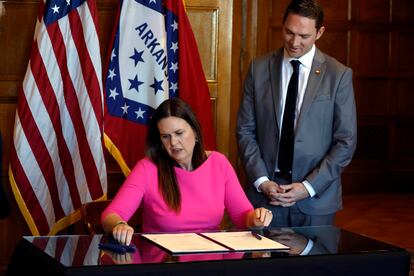Judge blocks Arkansas law requiring parental OK for minors to create social media accounts
Arkansas’ law is similar to a first-in-the-nation restriction signed into law earlier this year in Utah

A federal judge on Thursday temporarily blocked Arkansas from enforcing a new law that would have required parental consent for minors to create new social media accounts, preventing the state from becoming the first to impose such a restriction.
U.S. District Judge Timothy L. Brooks granted a preliminary injunction that NetChoice — a tech industry trade group whose members include TikTok, Facebook parent Meta, and X, formerly known as Twitter — had requested against the law. The measure, which Republican Gov. Sarah Huckabee Sanders signed into law in April, was set to take effect Friday.
Arkansas’ law is similar to a first-in-the-nation restriction signed into law earlier this year in Utah. That law is not set to take effect until March 2024. NetChoice last year filed a lawsuit challenging a California law requiring tech companies to put kids’ safety first by barring them from profiling children or using personal information in ways that could harm children physically or mentally.
In a 50-page ruling, Brooks said NetChoice was likely to succeed in its challenge to the Arkansas law’s constitutionality and questioned the effectiveness of the restrictions.
“Age-gating social media platforms for adults and minors does not appear to be an effective approach when, in reality, it is the content on particular platforms that is driving the state’s true concerns,” wrote Brooks, who was appointed to the bench by former President Barack Obama.
Similar laws placing restrictions on minors’ use of social media have been enacted in Texas and Louisiana, which also aren’t scheduled to take effect until next year. Top Republicans in Georgia have said they’ll push for a parental consent measure in the Legislature next year, and some members of Congress have proposed similar legislation.
NetChoice argued the requirement violated the constitutional rights of users and arbitrarily singled out types of speech that would be restricted.
“We’re pleased the court sided with the First Amendment and stopped Arkansas’ unconstitutional law from censoring free speech online and undermining the privacy of Arkansans, their families and their businesses as our case proceeds,” Chris Marchese, director of the NetChoice Litigation Center, said in a statement. “We look forward to seeing the law struck down permanently.”
Republican Attorney General Tim Griffin said he was disappointed with Brooks’ decision.
“But I will continue to vigorously defend the law and protect our children, an important interest recognized in the federal judge’s order today,” Griffin said in a statement.
Arkansas’ restrictions would have only applied to social media platforms that generate more than $100 million in annual revenue. It also wouldn’t have applied to certain platforms, including LinkedIn, Google and YouTube.
Brooks’ ruling said the the exemptions nullified the state’s intent for imposing the restrictions, and said the law also didn’t adequately define which platforms they would apply to. As an example, he cited confusion over whether the social media platform Snapchat would be subject to the age-verification requirement.
Social media companies have faced increasing scrutiny over their platforms’ effect on teen mental health, one of the concerns Sanders cited as she pushed for the legislation.
U.S. Surgeon General Vivek Murthy has warned that there is not enough evidence to show that social media is safe for children and teens and called on tech companies to take “immediate action to protect kids now.” Meta announced in June it was adding some new parental supervision tools and privacy features to its platforms.
Social media companies that knowingly violate the age verification requirement would have faced a $2,500 fine for each violation under the now-blocked law. The law also prohibited social media companies and third-party vendors from retaining users’ identifying information after they’ve been granted access to the social media site.
Sign up for our weekly newsletter to get more English-language news coverage from EL PAÍS USA Edition
Tu suscripción se está usando en otro dispositivo
¿Quieres añadir otro usuario a tu suscripción?
Si continúas leyendo en este dispositivo, no se podrá leer en el otro.
FlechaTu suscripción se está usando en otro dispositivo y solo puedes acceder a EL PAÍS desde un dispositivo a la vez.
Si quieres compartir tu cuenta, cambia tu suscripción a la modalidad Premium, así podrás añadir otro usuario. Cada uno accederá con su propia cuenta de email, lo que os permitirá personalizar vuestra experiencia en EL PAÍS.
¿Tienes una suscripción de empresa? Accede aquí para contratar más cuentas.
En el caso de no saber quién está usando tu cuenta, te recomendamos cambiar tu contraseña aquí.
Si decides continuar compartiendo tu cuenta, este mensaje se mostrará en tu dispositivo y en el de la otra persona que está usando tu cuenta de forma indefinida, afectando a tu experiencia de lectura. Puedes consultar aquí los términos y condiciones de la suscripción digital.








































